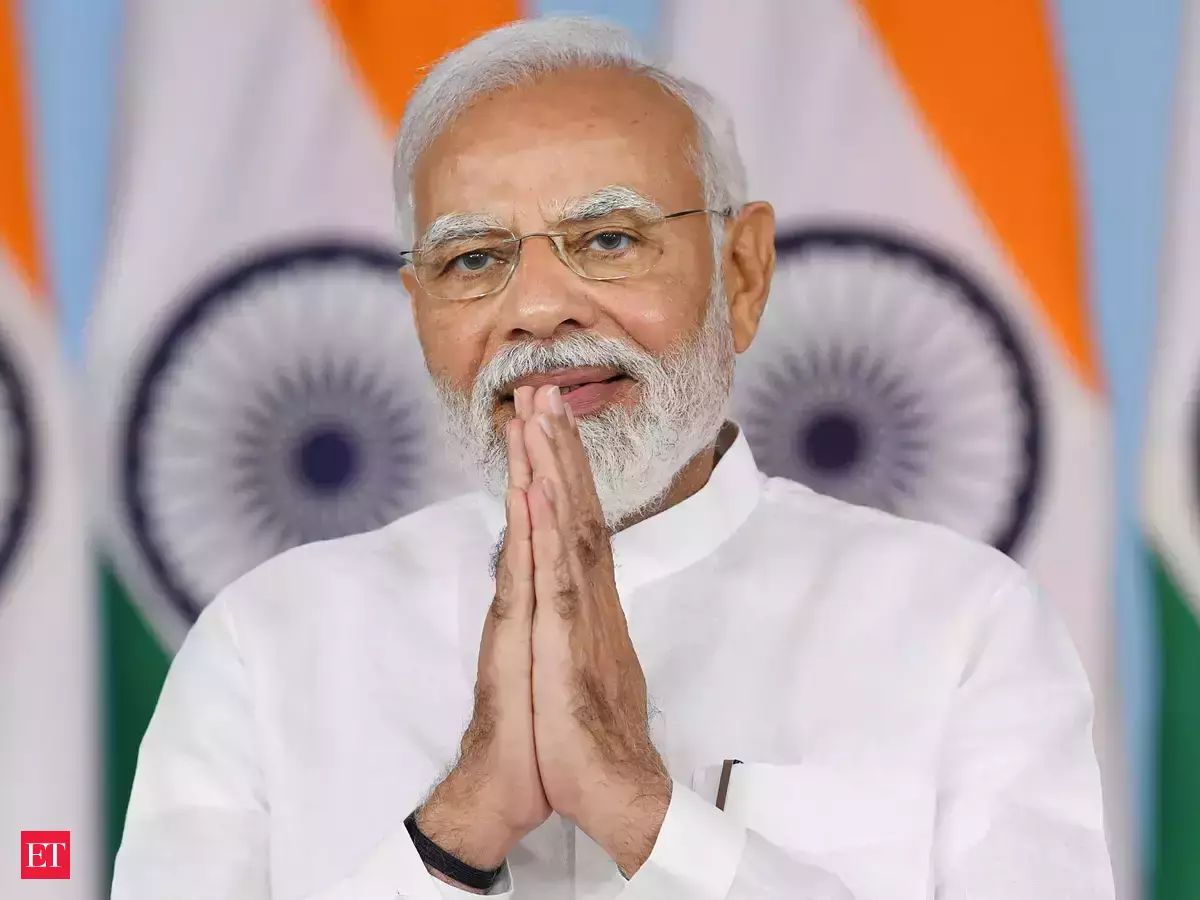


In a powerful speech in Lok Sabha, Prime Minister Narendra Modi proposed 11 resolutions for the country's future, including upholding existing reservations and rejecting any religion-based quota. He also called for an end to dynastic politics and a zero-tolerance policy towards corruption. While the Congress criticized his speech as "boring" and accused him of avoiding addressing issues of injustice and inequality, the PM stressed on the need for all citizens to fulfill their duties and work towards inclusive development.
India's Constitution: A Legacy of Inclusivity and Progress
The Indian Constitution, enacted on January 26, 1950, serves as the supreme law of the land. It embodies the aspirations of a diverse nation, enshrining principles of democracy, equality, justice, and liberty.
In a recent address to the Lok Sabha (lower house of the Indian Parliament), Prime Minister Narendra Modi outlined 11 resolutions for the country's future that affirm the Constitution's ideals. These resolutions include:
Background
The Indian Constitution was drafted by the Constituent Assembly of India, an elected body convened in 1946. It was chaired by Dr. B.R. Ambedkar, a renowned Dalit leader and legal luminary. The Assembly spent nearly three years meticulously drafting the Constitution, which was adopted on January 26, 1950.
The Constitution was influenced by various sources, including the British Government of India Act of 1935, the Irish Constitution, and the United States Constitution. However, it was uniquely tailored to the specific needs and aspirations of the Indian people.
Top 5 FAQs
1. What are the main provisions of the Indian Constitution?
The Indian Constitution establishes a democratic, secular, and federal republic. It guarantees fundamental rights, including the right to equality, freedom of religion, speech, and assembly. It also establishes a strong central government with shared powers between the Union and state governments.
2. What is the significance of reservations in India?
Reservations are a form of affirmative action designed to address historical and present-day discrimination faced by marginalized communities, such as Scheduled Castes (Dalits) and Scheduled Tribes (Adivasis). The Constitution provides for reservations in government jobs, educational institutions, and political offices to ensure their equitable representation and empowerment.
3. What is the debate surrounding religion-based quotas?
While the Constitution prohibits discrimination based on religion, there have been demands for reservations for certain religious communities, particularly Muslims. Opponents argue that such quotas would undermine the principle of equality and create further divisions within society. The government has consistently rejected any form of religion-based reservations.
4. What is dynastic politics?
Dynastic politics refers to the practice of political power being passed down within families. Critics argue that this perpetuates inequality and limits opportunities for talented individuals outside established political dynasties.
5. What is the role of citizens in upholding the Constitution?
All citizens have a duty to uphold the Constitution and its principles. This includes respecting fundamental rights, participating in democratic processes, and contributing to the welfare and progress of the nation.
Conclusion
The Indian Constitution continues to guide the nation's journey towards a just and equitable society. Prime Minister Modi's 11 resolutions reaffirm the Constitution's foundational principles and set a path for India's future development. By working together and adhering to the Constitution's ideals, India can create a truly inclusive and prosperous society for all its citizens.

Prime Minister Narendra Modi met veteran BJP leader and Bharat Ratna awardee Lal Krishna Advani at his residence on Saturday, on the occasion of his 98th birthday. PM Modi took to social media to extend birthday greetings and praise Advani's monumental service to the nation, calling him a statesman with a towering vision. Home Minister Amit Shah and former Vice President M. Venkaiah Naidu also sent their wishes, highlighting Advani's contributions to strengthening the BJP and the country's progress.

Prime Minister Narendra Modi inaugurated a two-day conference on strengthening the legal aid system in India. He highlighted the crucial role of ensuring ease of justice in achieving the goals of ease of doing business and ease of living. The conference will discuss key aspects of the legal services framework, including the role of technology and mediation in improving justice delivery. PM Modi also launched a training module for community mediation to empower individuals in resolving disputes at the grassroots level.

Anumula Revanth Reddy, the Congress legislature party leader, will be taking oath as the second Chief Minister of Telangana amidst great anticipation as senior officials and one lakh people are expected to attend the event. Prominent leaders like Sonia Gandhi, Rahul Gandhi, and Priyanka Gandhi Vadra will also be present at the ceremony. Reddy has extended an open invitation to the public, emphasizing the 'people's government' he aims to establish.

A political controversy has emerged during the Bihar assembly elections after VVPAT slips were found dumped near a college in Samastipur. The Chief Election Commissioner has clarified that the slips were used in mock polls and did not affect the actual voting process. However, the RJD and Congress have raised questions about the conduct of the election and an on-the-spot investigation has been ordered.

In a shocking incident, a large number of VVPAT slips were found scattered on the roadside in Bihar's Samastipur district. The Election Commission swiftly took action and suspended an assistant returning officer for negligence, along with filing a FIR against him. The DM has been asked to inquire into the matter and an investigation has been launched. Though the integrity of the polling process remains uncompromised, the incident has raised serious concerns about the security and transparency of elections in India.

A clash broke out between West Bengal Police and Border Security Force (BSF) over the seizure of a smuggled consignment of banned syrup, phensedyl, in Nadia district. Three police personnel were injured and one BSF jawan was detained in the incident. However, senior officers from both sides were able to resolve the misunderstanding and the detained BSF jawan was released. BSF and police assure cooperation in serving national interests.

Leaders of the opposition Congress party in the Indian state of Goa have launched a scathing critique of the ruling Bharatiya Janata Party (BJP), slamming them for their failure to ensure law and order in the wake of multiple murders, including that of activist Umakant Khote. The Congress leaders called for an emergency assembly session to address what they termed a "complete breakdown of policing and governance," citing a string of violent incidents as evidence of a systemic failure. According to the opposition, Goa's reputation as a peaceful tourist destination has been tarnished by a rise in crime and corruption, worsened by economic struggles that have left locals vulnerable to land grabs by private developers.

The Goa government, under CM Pramod Sawant, has granted two district magistrates the power to invoke the National Security Act for a period of three months. The move comes after a spate of incidents involving organised crime in the state and the police's request for preventive arrest powers. This decision is likely to spark controversy as the NSA allows for detention without formal charges or trial for up to 12 months.

Prime Minister Narendra Modi continues to campaign in Bihar, warning voters of the potential dangers of an opposition alliance led by the RJD and the Congress. He claims that the people fear a 'katta raj' (the rule of guns) if this alliance wins the upcoming state election. Modi also criticizes the RJD's campaign tactics, stating that they are promoting violence and crime. He urges the people to choose the NDA regime instead, which he says will promote development and progress rather than violence.

Amid the ongoing Special Intensive Revision campaign by the Election Commission in Goa, schools and colleges are facing severe disruptions in their operations due to the deployment of crucial administrative and support staff for voter verification duties. This move has left educational institutions struggling with a severe manpower shortage, affecting day-to-day academic and administrative operations. Manpower crisis intensified as the Education Department refused to issue approvals for hiring temporary replacements, signaling a potential administrative paralysis in the state's education system.